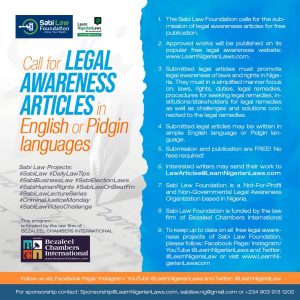Distinction Between Non-Payment and Inadequate Payment of Court Filing Fees. Daily Law Tips (Tip 776) by Onyekachi Umah, Esq., LL.M, ACIArb(UK)
Introduction:
Justice is not free, as litigants must pay court filing fee to courts, for their cases to be attended to, by magistrates and judges. Over the years the costs of filing cases in courts have increased with every new rules of courts. In a judicial system that plans to generate funds from filing fees paid into courts, failure to pay filing fees and inadequate filing fees have varying effects and may jeopardize justice. Hence, understating the distinction between non-payment and inadequate payment of court filing fees is important.
Filling fees and access to justice:
The courts in Nigeria are expected to establish and charge filing fees from disputants before accepting their cases. Government and government agencies do not pay filing fees. The fees are often expensive, as such they discourage disputants from claiming high damages, since high damages translate to high filing fees. The fees at times discourage disputants from accessing the courts, coupled with the complexity of procedures of the courts and delays in courts.
Often, stakeholders argue that the court filing fees (court cost) are set to discourage frivolous cases. However, the costs are not justifiable, since truly government provides budget. By the way, frivolous cases can easily be discouraged by having judges order punitive fees against concerned disputants and their lawyers. Also, for the lawyers, courts should report them to their professional body (the Nigerian Bar Association and others). Court filing fees (court cost) are increasing and they are obviously decreasing access to justice among indigent Nigerians and thereby encouraging self-help.
Non-Payment Vs. Inadequate Payment of Court Filing Fees and their Effects:
This section focuses on clarifying the distinction between non-payment of filing fees from inadequate payment of filing fees. It will reveal their nature and impact to access to justice. No one understands the courts in Nigeria more than the judges, especially the judges that have been promoted from the lower courts to the Supreme Court.
The Supreme Court of Nigeria is the apex court in Nigeria, its judgments are final and its judges are more experienced than any other. They have the best skill to determine the distinction between non-payment and inadequate payment of court filing fees. Below are the words of the justices of the Supreme Court of Nigeria, on the “Distinction between Non-Payment and Inadequate Payment of Court Filing Fees”, through the judgments of the Supreme Court of Nigeria:
- First of all, “Filing fees in civil appeals (cases) are generally set out by the Rules of Court and paid to the registrar of the appropriate court from which the appeal emanates.” Per MUHAMMAD, J.S.C (P. 38, paras. A-B) in the case of SPDC & ORS v. AGBARA & ORS (2015) LPELR-25987(SC).
- On the purpose of filing fees; “…In our system of Court administration it is not possible for a litigant to walk into our Courts to institute a suit without paying fees. Such fees are being charged for the purpose of raising funds for public revenue. They are not being charged to punish the litigants for deciding to take advantage of the provisions of Section 6 subsection (6) of the 1979 Constitution. The fact that the fees payable are increased in certain categories of cases does not render the charging of the increased fees unconstitutional. It is not within the province of the Courts to conjecture as to the reasons why the higher fees are being charged for as long as the 1988 Edict does not state the purpose for which the higher fees are being charged. The function of the Courts is to interpret the law but not to bring to bear extrinsic reasons as to why the law is made. For the same reason it will be wrong, in my opinion, for the Courts to consider whether prospective litigants are in a position to pay the fee prescribed or not in determining whether the charging of the fee is constitutional. See: Nwosu’s case (supra).” Per MUHAMMADU LAWAL UWAIS ,J.S.CÂ ( P. 23, paras. A-E ) in the case of ATOLAGBE & ANOR v. AWUNI & ORS (1997) LPELR-593(SC)
- “In SC. 693/2013 an appeal on an identical issue decided by the Court on 11/12/15 in my concurring judgment to the leading judgment delivered by my learned brother I.T Muhammed, JSC I said that:”…….. non-payment of filing fees is different from inadequate payment, the latter being the fault of the Registry……..” I must say that non payment of filing fees is a serious omission by the Appellant which in effect deprives the Court of jurisdiction to hear the appeal. see Okolo v. UBN Ltd (2004) 3 NWLR (Pt.859) p. 87. On the other hand in adequate payment of filing fees is usually the fault of the Registry who made a mistake when it told the Appellant the amount to be paid. In cases where the fees paid by the Appellant are inadequate it is the singular duty of the presiding Judge to order the erring Appellant to pay the correct filing fees instead of striking out the appeal.” Per RHODES-VIVOUR ,J.S.C ( Pp. 35-36, paras. F-D) in the case of NIGERIA AGIP OIL CO. LTD v. NKWEKE & ANOR (2016) LPELR-26060(SC)
- “I begin with the issue of filing fees. Payment of filing fees is a precondition to Court’s assumption of jurisdiction in a case. The rules of Court make this mandatory. See ONWUGBUFOR VS OKOYE (1996) 1 NWLR (Pt. 424) 252 at 292 per Iguh, JSC. However, the Appellants’ contention is not that fees were not paid, but that the appropriate fees have not been paid by the Respondent. This is an assertion on the part of the Appellants. Proof is required as to what ought to be paid and what was actually paid. The Appellants have not proved that the assessment of the Court’s Registrar was wrong neither did they state the amount that the Respondent ought to pay.” Per BAGE ,J.S.C ( P. 8, paras. C-F ) in the case of SULE & ORS v. ORISAJIMI (2019) LPELR-47039(SC)
- “Payment of filing fees is a precondition to or condition precedent to the court’s assumption of jurisdiction. Where filing fees are not paid, a court of law will have no jurisdiction to entertain the matter before it. This is because the rules of court make it mandatory for a party to pay filing fees. This is because the rules of Court make it mandatory for a party to pay filing fees.” Per TOBI ,J.S.C ( P. 14, paras. A-B ) in the case of OKOLO & ANOR v. UBN LTD (2004) LPELR-2465(SC)
- “…the failure to remedy or pay the deficiency does not and should not raise an issue of jurisdiction but the consequential effect is a mere irregularity and which is not capable in affecting the validity of the proceedings. See the cases of Akpaji v. Udemba (2009) 2 NMLR 183; ACB Ltd v. Henshaw (1990) 1 NWLR (Pt 129) 646 at 650; Noibi v. Fikolati & Anor (1987) 1 NMLR (Pt.52) 619 at 632.” Per OGUNBIYI ,J.S.C ( P. 76, paras. A-B ) SPDC & ORS v. AGBARA & ORS (2015) LPELR-25987(SC)
- “…the law has for long been settled by authorities that payment of inadequate filing fees can only make a process irregular and not capable of affecting the jurisdiction of the court. See: Onwugbufor & 2 Ors v. Okoye & 3 Ors; Akpaji v. Udemba (2009) 6 NWLR (Pt.1138) 545.” Per MUHAMMAD ,J.S.C ( Pp. 56-57, paras. E-A ) SPDC & ORS v. AGBARA & ORS (2015) LPELR-25987(SC)
- “…where inadequate fees are paid, I agree with learned appellants’ counsel, the usual remedy is an order of court for the short fall to be paid. Non-payment of adequate fees, it has been held, does not ordinarily rob the court its jurisdiction. In ACB Ltd v. Henshaw (1990) 1 NWLR (pt 129) 646, a decision this court cited with approval in reiterating the principle, Oguntade JCA (as he then was) at page 651 of the report puts the position succinctly thus: “Even if the Defendant/Respondent had not paid the requisite court fees, this was a matter to be settled before the Lower Court the usual remedy being on order by the Lower Court that the appropriate fees or any short fall be paid. It certainly has nothing to do with the jurisdiction of the Lower Court to entertain the suit.” This Court in Onwugbufor & 2 Ors v. Okoye & 3 Ors (1996) 1 NWLR (Pt 424) 252 at 291-292 also states per Iguh JSC thus:- “If the default in payment is that of the plaintiff, the claim in respect of which such prescribed fees have not been paid cannot be said to be properly before the court and should be struck out in the absence of an appropriate remedial action or application to regularise such anomaly.” Per MUHAMMAD ,J.S.C ( Pp. 18-19, paras. G-E ). OGWE & ANOR v. IGP & ORS (2015) LPELR-24322(SC)
- “It is basic to say it without any form of hesitation that based on the position of this court in the case of Akpaji v. Udemba (supra), payment of inadequate filing fees is a mere irregularity. The usual remedy should be an order that the appropriate filing fees or its short fall be paid. Such a short fall has nothing to do with the jurisdiction to hear the appeal as in the instant appeal and ought not to be a basis for the court to strike out the appeal.” Per FABIYI ,J.S.C ( P. 24, paras. D-F ) OGWE & ANOR v. IGP & ORS (2015) LPELR-24322(SC)
- “I wish to say that generally, payment of a prescribed filing fee, by all litigants except the government, is a pre-condition to the validity of any process filed in the Court. Unless the pre-condition is satisfied, the Court will lack the jurisdiction to entertain a process the prescribed filing fee of which has not been paid. … If the default in payment is that of the plaintiff, the claim in respect of which such prescribed fees have not been paid cannot be said to be properly before the Court and should be struck out in the absence of an appropriate remedial action or application to regularize such anomaly.” Per ADEREMI ,J.S.C ( Pp. 31-33, paras. C-A ) in the case of ABIA STATE TRANSPORT CORPORATION & ORS v. QUORUM CONSORTIUM LTD (2009) LPELR-33(SC)
- “It is worthwhile to note that Section 30 of the Court of Appeal Act defines an appeal to include an application for leave to appeal and an appellant to include the person who makes such application. In any event once it is shown that the appellant has paid the filing fees as assessed by the officer whose responsibility it is to do so, whether at the trial court or the Court of Appeal as the case may be, the appeal is, on the authorities, duly filed and same cannot be legally struck out. Otherwise the appellants would be made to suffer for the fault, negligence or inadvertence of another. Where the fault of the payment of inadequate filing fees in respect of the appeal is traceable to the officer who assessed the fees it would be unfair not to place the blame where it truly is. See Iyalabani Co Ltd V. Bank of Baroda (1995) 44 NWLR (Pt.387) 20, Bowaje V. Adediwura (1976) 6 SC 143, Doherty V. Doherty (1964) 1 NLR 299 and Ahmadu V. Salawu (197411 NLR (Pt.11) 318.” Per MUHAMMAD ,J.S.C ( Pp. 20-21, paras. D-B ) OGWE & ANOR v. IGP & ORS (2015) LPELR-24322(SC)
Conclusion:
Filling fees are assessed and collected by courts for cases. They are paid before disputants and their lawyers are allowed to file documents in courts, except government and govern agencies.. The filing fees having been going up even as the courts keep receiving allocations from government to run the affairs of courts. Generally, payment of filling fees is one of the facts that discourage disputants in courts. Failure to pay filing fees have been differentiated from failure to pay adequate filling fees. Payment of court filing fees is a statutory condition and where it is lacking the court has no jurisdiction over a case. However, where there is an inadequate payment of court filing fees (often due to wrong assessment and mistake of the court registry), it is a mere irregularity that does not affect the jurisdiction of the court. Rather, the court would rather make an order for the balance of the fees to be paid. Now you know the distinction between non-payment and inadequate payment of court filing fees.
My authorities, are:
- The judgment of the Supreme Court of Nigeria in the case of SPDC & ORS v. AGBARA & ORS (2015) LPELR-25987(SC)
- The judgment of the Supreme Court of Nigeria in the case of NIGERIA AGIP OIL CO. LTD v. NKWEKE & ANOR (2016) LPELR-26060(SC)
- The judgment of the Supreme Court of Nigeria in the case of SULE & ORS v. ORISAJIMI (2019) LPELR-47039(SC)
- The judgment of the Supreme Court of Nigeria in the case of OKOLO & ANOR v. UBN LTD (2004) LPELR-2465(SC)
- The judgment of the Supreme Court of Nigeria in the case of OGWE & ANOR v. IGP & ORS (2015) LPELR-24322(SC)
- Onyekachi Umah, “How to Certify Documents & Make Affidavits Without Courts” (LearnNigerianLaws.com, 14 April 2021) <https://sabilaw.org/how-to-certify-documents-make-affidavits-without-courts/> accessed 16 April 2021
- Onyekachi Umah, “Why Courts Must Hear Stupid Applications/Motions?” (LearnNigerianLaws.com, 17 September 2020) <https://sabilaw.org/why-courts-must-hear-stupid-applications-motions/> accessed 16 April 2021
- Onyekachi Umah, “When Courts Must Refuse To Consider Issues/Applications Before It” (LearnNigerianLaws.com, 10 September 2020) <https://sabilaw.org/when-courts-must-refuse-to-consider-issues-applications-before-it/> accessed 16 April 2021
- Onyekachi Umah, “Oral Application for Bail is Allowed in High Courts” (LearnNigerianLaws.com, 31 August 2020)<https://sabilaw.org/oral-application-for-bail-is-allowed-in-high-courts/> accessed 16 April 2021
- Pic credit: speakupforjustic.org
Sabi Law Projects:
#SabiLaw
#DailyLawTips
#SabiBusinessLaw
#SabiElectionLaws
#SabiHumanRights
#SabiLawOnTheBeatFm
#SabiLawLectureSeries
#CriminalJusticeMonday
#SabiLawVideoChallenge
Speak with the writer, ask questions or make inquiries on this topic or any other via onyekachi.umah@gmail.com, info@LearnNigerianLaws.com or +2348037665878 (whatsapp). To receive free Daily Law Tips, join our free WhatsApp group via https://chat.whatsapp.com/L7h4f1exItZ38FeuhXG4WN or Telegram group, via the below link: https://t.me/LearnNigerianLaws
To keep up to date on all free legal awareness projects of Sabi Law Foundation, follow us via
Facebook Page:@LearnNigerianLaws,
Instagram:@LearnNigerianLaws,
Twitter: @LearnNigeriaLaw,
YouTube: Learn Nigerian Laws,
WhatsApp Groups via (https://chat.whatsapp.com/L7h4f1exItZ38FeuhXG4WN),
Telegram Group: (https://t.me/LearnNigerianLaws),
Facebook group: (https://www.facebook.com/groups/129824937650907/?ref=share)
or visit our website: (www.LearnNigerianLaws.com)
Please share this publication for free till it gets to those that need it most. Save a Nigerian today! NOTE: Sharing, modifying or publishing this publication without giving credit to the author or Sabi Law Foundation is a criminal breach of copyright and will be prosecuted. This publication is the writer’s view not a legal advice and does not create any form of relationship. You may reach the writer for more information.
This publication is powered by www.LearnNigerianLaws.com {A Free Law Awareness Program of Sabi Law Foundation, supported by the law firm of Bezaleel Chambers International (BCI).} Sabi Law Foundation is a Not-For-Profit and Non-Governmental Legal Awareness Organization based in Nigeria. For sponsorship and partnership, contact: sponsorship@learnnigerianlaws.com, sabilaw.ng@gmail.com or +234 903 913 1200.























































